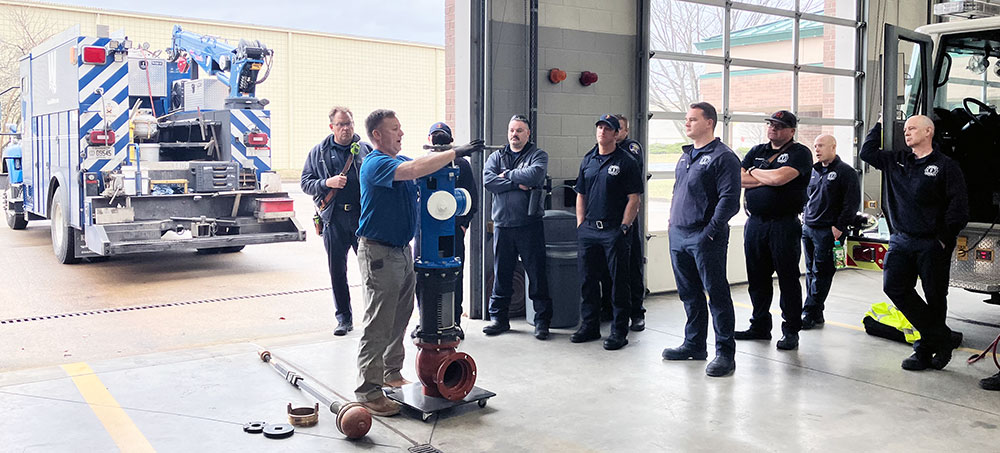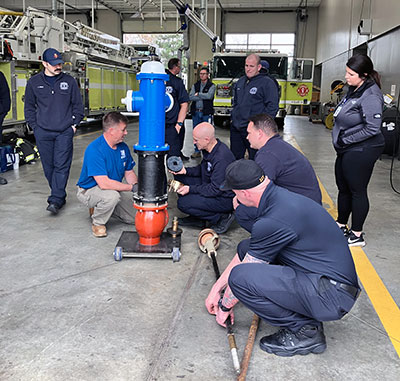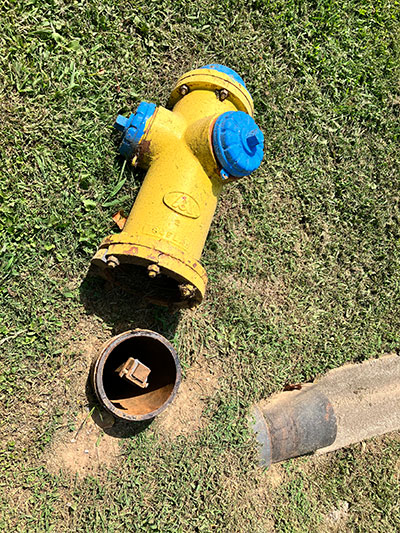“Chris and I are in charge of all the hydrants, over 25,000. So, we might be in Goshen and all of a sudden, we’re out at Bernheim Forest and then we’re down in Portland,” Louisville Water Plumber Leader’s Assistant Scott Corbin explained to a large group of firefighters at Jeffersontown Fire Station No. 3.
Corbin and Plumber Leader Chris Meeks along with Environmental Health and Safety Manager Dave Simmons have travelled to fire departments all over Jefferson County in the last year, rekindling the long relationship between Louisville Water and the fire departments. Firefighters rely on an abundant supply of water to douse flames in an emergency and to do that, they’re counting on quick access to working fire hydrants.

“In an emergency situation, they don’t have a lot of time,” Corbin said.
In return, he and Meeks rely on firefighters and the community to alert them to issues with hydrants so they can repair them. As part of the preventive maintenance, the pair is working on educating firefighters how to properly handle the hydrants.
“A lot of those guys are really strong, and they might overtighten (the hydrant) and then the coupling breaks,” Meeks said. Or worse, it could create a water hammer which can rupture a pipe or break the hydrant. Corbin explained to the firefighters that taking a few extra minutes can save everyone headaches and costly repairs.
 Captain Matt Slyter, a veteran firefighter of 20 years heard the message loud and clear.
Captain Matt Slyter, a veteran firefighter of 20 years heard the message loud and clear.
“He drove home the point of closing slowly and really not overtightening it when you don’t feel the dead spot at the end. I’ve probably been guilty of overtightening them myself.”
“Whenever it’s hard to turn, that means it’s failing. We need to get in there and rebuild it,” Corbin said.
He used what’s called a fire hydrant cutout to let the firefighters see the inside of the hydrant and understand the various parts, how they work together, and what can happen if they’re misused.
Extending that message to the public is just as important. Corbin and Meeks say they’ve stumbled upon broken hydrants countless times.
“We went to a hydrant and the head was stolen. Only the lower barrel was sticking up and half of it had a chunk out of it from where the car damaged it. It was all rusted so that means it’s been sitting there for a while,” Corbin said. “These things are everywhere and if somebody doesn’t call it in, a lot of times, we don’t know.”
 Meeks added, “When they’re (the hydrants) hit, sometimes people will actually set them neatly back on the thing and when we come to touch them, they just fall over. They think it makes it go away.”
Meeks added, “When they’re (the hydrants) hit, sometimes people will actually set them neatly back on the thing and when we come to touch them, they just fall over. They think it makes it go away.”
Every second matters when the fire departments arrive on the scene. Louisville Water’s goal is to set them up for success as much as we can.
“I have had to call the water company up for broken hydrants and they’ve always been super easy to work with and eager to come out and help,” Captain Slyter shared. “I think it’s very helpful that everyone’s so open to communicating with us.”
As long as Corbin and Meeks are in charge of servicing hydrants, they plan to keep the communication flowing.
Corbin said, “Our relationship has improved as far as them knowing who to contact, as far as we know who to contact if we have any questions, and as far as what they expect from us and kind of what we expect from them. They are on these hydrants way more than we are a lot of times.”
The crew is scheduled to meet with Fairdale firefighters later this month.
He says their goal is to eventually, “go to the training facilities whenever they have a class. Then we train them then whenever they start out because then we catch right at the beginning to prevent any bad habits.”
If you need to report a leaking or broken fire hydrant, please contact Louisville Water with the specific location.

